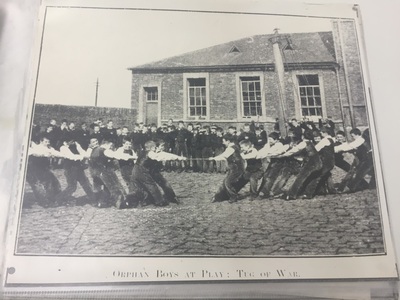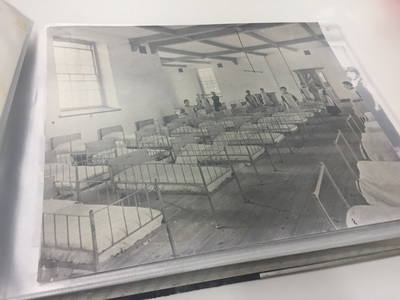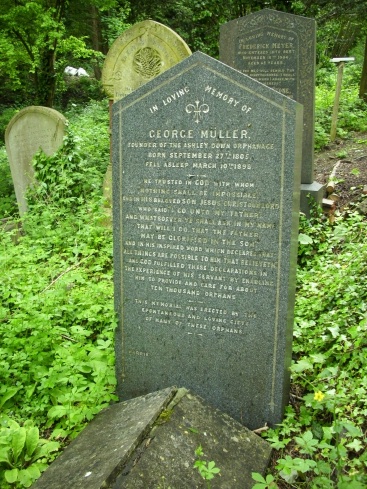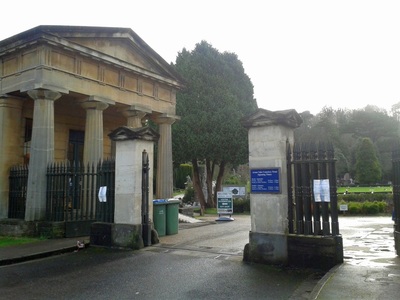|
Legacy of Faithfulness: George Muller
By Josh Buice Recently, my wife and I spent nine days in London and traveled out each day to various cities such as Bristol, Bedford, Cambridge, Oxford, and Edinburgh, Scotland. Upon our return home, I decided to write a series of posts on the lives of specific people from church history that left us with testimonies of genuine faith in the gospel, perseverance under persecution, and remained steadfast to the end. The goal in this series of articles is to lightly explore their lives and focus on their perseverance in the gospel of Jesus Christ. A life that finished well in the gospel is a life worth remembering. We have already looked at the lives of John Bunyan and Charles Spurgeon. Today’s focus is a man known as Muller. George Muller’s Salvation and Doctrine George Muller was born in Kroppenstaedt, a Prussian village, on September 27, 1805. George Muller was born as a German, but also as a sinner. He loved his sin and excelled in it. According to his very own testimony, he was a liar and a thief. [1] After finding himself in jail for stealing at 16 years of age, his father devised a plan for his life that would be a good occupation for his son and a good retirement plan for himself. Muller’s father sent him to the University of Halle to study divinity and prepare for the ministry. There was no desire for God by George or his father. In November of 1825, when Muller was 20 years old, he was invited to a Bible study and that was the turning point for this man. He would come to discover his true happiness in God. Later, he would discover the doctrines of grace, although he had often spoken evil of the doctrine of election. Muller came into contact with a particular man who taught him the doctrines of grace, and it literally changed his life and subsequent ministry. The doctrinal conviction of George Muller in God’s sovereignty changed the way he looked at the world, the way he trusted God, the way he prayed, and the way he preached. The present day stereotype of Calvinism as a missions killing doctrine is simply not accurate. If anyone could put that to death by demonstrating what real Calvinism looks like in the pulpit and in mission, it’s George Muller. George Muller’s Preaching Ministry George Muller spent his life in Bristol, England (west of London). He gave his life primarily to one church for 66 years. It’s estimated that he preached nearly 10,000 sermons to the flock that God entrusted to his care. Muller had challenges that he faced, people to care for, orphans to minister to, and he did all of this while preaching every week for over six decades. His passion was relentless. His preaching was God centered and Christ exalting. He didn’t manipulate people for results, yet many people came to faith under his preaching and were discipled in God’s Word. Early in his life, he had ambitions to become a missionary. At the age of 70, he set out to travel to different countries to preach the gospel. He visited 42 different countries over a period of 17 years and preached to between 3 and 4 million people. [2] Muller would often preach in the people’s known language since he knew six languages fluently (Latin, Greek, Hebrew, German, French, and English). George Muller’s Legacy of Faith George Muller had a love for God and this self denying and God glorying pursuit led him to engage in ministry to orphans. In Bristol during his time, there was a massive problem with orphans. When Muller recognized it, he put his hand to the plough and never looked back. Muller prayed for God to provide the land, and God provided. He prayed for God to provide the housing, and God provided. He then prayed for God to provide the children, and God provided. The first orphan entered Muller’s care on 11th of April 1836. The first entry into their log books was Charlotte Hill. [3] Over the course of Muller’s ministry, he would care for over 10,000 orphans and through his ministry beyond his death, 17,000 orphans in total would be ministered to. He was serving as unto the Lord rather than unto men. During Muller’s ministry, he experienced hardships and trials. He married Mary Groves at the age of 25, and they had four children, two of which were stillborn. His son Elijah died when he was only 1 year old. Mary preceded him in death. If you travel to Bristol, you can see the sermon text from Mary’s funeral in the little one room museum devoted to George Muller. As he preached her funeral, more than 800 people gathered outside in overflow and were unable to enter due to the crowd. Muller said of his wife Mary: Were we happy? Verily we were. With every year our happiness increased more and more. I never saw my beloved wife at any time, when I met her unexpectedly anywhere in Bristol, without being delighted so to do. I never met her even in the Orphan Houses, without my heart being delighted so to do. Day by day, as we met in our dressing room, at the Orphan Houses, to wash our hands before dinner and tea, I was delighted to meet her, and she was equally pleased to seeme. Thousands of times I told her—“My darling, I never saw you at any time, since you became my wife, without my being delighted to see you.” Yet through the death of his children and the death of his wife, he never became sidetracked in his mission for God. He would marry Susannah Sangar at 66 years of age. She too would precede him in death. Yet, Muller kept serving God. George Muller loved orphans because he loved God and God had demonstrated love to Muller who was lost in his sin. Muller had unshakable faith in God to provide. He never asked people for money, but he did ask God for the people’s money. He was constantly on his knees praying. Two years after the first orphans entered his care, he had no money. On the morning of August 18th, 1838 he writes in his journal, “I have not a penny in hand for the orphans. In a day or two many pounds will be needed. My eyes are up to the Lord.” By that evening, he wrote in the journal, “Before this day is over, I have received from a sister 5 pounds. She had some time since put away her trinkets to be sold for the benefit of the orphans. This morning, whilst in prayer, it came to her mind, I have this 5 pounds, and owe no man anything, therefore it would be better to give this money at once, as it may be some time before I can dispose of the trinkets. She therefore brought it, little knowing that there was not a penny in hand.” [4] George Muller lived among the orphans and loved them dearly. He invested in them by teaching them the gospel, educating them, and although he received grief because the orphans were often better educated than those who came from good homes in Bristol, the business owners eventually had to compete for the orphans who were “graduating” from the care of Muller. One famous story about Muller’s faith is taken from a specific time when the orphans were out of food: “The children are dressed and ready for school. But there is no food for them to eat,” the housemother of the orphanage informed George Mueller. George asked her to take the 300 children into the dining room and have them sit at the tables. He thanked God for the food and waited. George knew God would provide food for the children as he always did. Within minutes, a baker knocked on the door. “Mr. Mueller,” he said, “last night I could not sleep. Somehow I knew that you would need bread this morning. I got up and baked three batches for you. I will bring it in.” Soon, there was another knock at the door. It was the milkman. His cart had broken down in front of the orphanage. The milk would spoil by the time the wheel was fixed. He asked George if he could use some free milk. George smiled as the milkman brought in ten large cans of milk. It was just enough for the 300 thirsty children. [5] Eventually George Muller’s work was finished. He led a prayer meeting at his church on the evening of Wednesday, March 9, 1898. The next day a cup of tea was taken to him at seven in the morning but no answer came to the knock on the door. He was found dead on the floor beside his bed. [6] The orphan-loving pastor was gone at age 92. The city of Bristol came to a standstill. All of the factories and shops closed. People lined the streets to pay tribute to the orphan-loving, Christ exalting, gospel preacher known by many as – Muller. According to Arthur Pierson, “A thousand children gathered for a service at the Orphan House No. 3. They had now for a second time lost a ‘father’.” [7] As the streets were lined with people, the casket made its way to the cemetery followed by a train of orphan children. Today, if you visit Bristol you will discover a tragedy. Nobody knows George Muller. Things changed over time and the way orphans were cared for changed politically, and so the mission of Muller and his care for the children was blessed by God. Eventually, the orphan houses became empty and were eventually sold. Muller saw the change coming and after his death, they continued to care for orphans and assist in providing care, but the orphan house ministry was no more. Over time the orphans disappeared from the streets. The orphan houses were sold. Today, if you walk the streets of Bristol and come to Ashley Down orphan houses, you will discover that of the five houses, two are apartments, and three are owned by a college. As my wife and I stood in the intersection and looked at the busy streets from beneath an umbrella, I asked Kari – “Why don’t we go into the visitor’s center and just ask them if they know the history of the buildings?” She reluctantly agreed. As we entered the busy building full of people, we approached a desk and I asked the lady, “Excuse me, you wouldn’t happen to know the history of this building would you?” She said, “Hang on.” She then got up and got a book with a blank cover and handed it to my wife and I and said, “There is a table over there, go take a seat and have a little read.” As we opened this book, it was a collection of approximately 40 photocopied pictures of all of Muller’s work with the oprhans. As my wife and I sat in the busy college campus, we wiped tears away as we considered the history and work of this man that Bristol has forgotten. We departed from that building and made our way to the cemetery where Muller was buried. We walked the street and arrived after dark. After discovering a way to enter the already closed cemetery, we asked permission at the newly constructed cafe to find a grave although it was already closed. After receiving permission, we walked up a muddy pathway in the dark to the location that we had on a small general map that was provided to us at the museum. It took a little effort, but we found his grave by flashlight. I must admit, I’m grateful to my wife for hanging with me on this journey. It’s hard to believe that this man of faith is buried back in a wooded cemetery in a city that has failed to remember him. One thing is for certain, George Muller may be forgotten by Bristol, but he is remembered by God. George Muller persevered in the faith and we can learn much from his life that was spent for the glory of God. George Mueller, Autobiography of George Mueller, or A Million and a Half in Answer to Prayer, compiled by G. Fred Bergin (Denton, Tex.: Westminster Literature Resources, 2003), 1:10. Arthur T. Pierson, George Mueller of Bristol and His Witness to A Prayer-Hearing God (Grand Rapids, Mich.: Kregel, 1999), 257. Originally published as “Authorized Memoir” (Old Tappan, N.J.: Fleming H. Revell, 1899). Roger Steer, George Muller – Delighted in God (Christian Focus Publications, Denmark, 2012), 65 Ibid., 77. “George Mueller, Orphanages Built by Prayer” Pierson, George Mueller, 285. Ibid., 286. Original article appeared at:
0 Comments
Your comment will be posted after it is approved.
Leave a Reply. |
Categories
All
Archives
June 2024
|
"The vigor of our spiritual life will be in exact proportion to the place held by the Bible in our life and thoughts."
- George Muller
- George Muller






 RSS Feed
RSS Feed